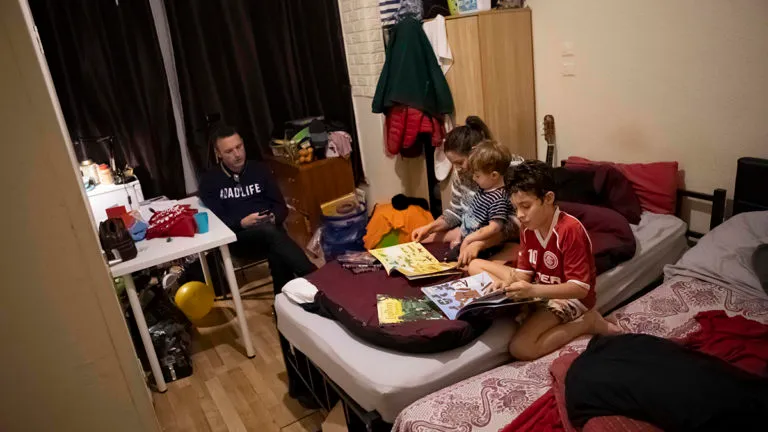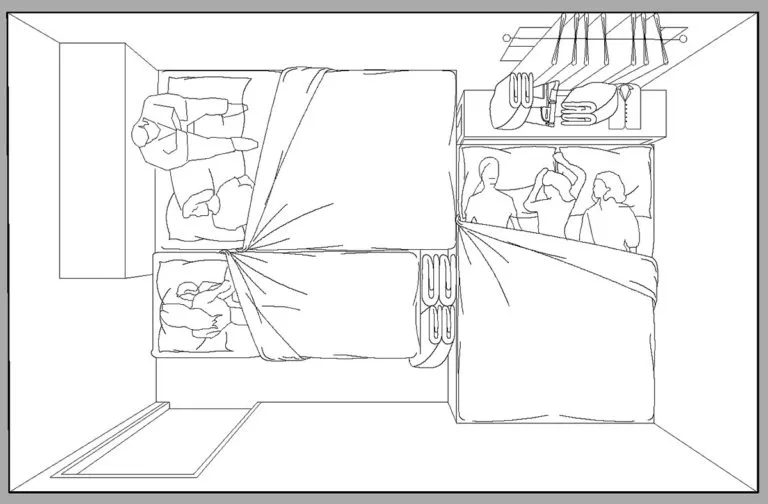Self-isolation? Try it as a homeless family living in one room
Published: by Deborah Garvie

Ministers must go further to help homeless families during this health crisis.
With the COVID-19 pandemic now taking hold in England, schools are now closed, and people being advised to work from home, many of us are wondering how we’ll cope with weeks of self-isolation and social distancing.
Experts are providing tips on how to deal with feeling like the walls are closing in. But in all the chaos, spare a thought for the homeless families living in cramped temporary accommodation, often for months on end, while they wait to be given a permanent home.
For some, this can mean a room the size of a parking space.
Thousands of families affected
This week’s government statistics show 5,400 homeless families are currently living in emergency hostels and homeless B&Bs. Not only do they have to sleep, eat, and live in one room, but they must often share toilets, bathrooms, and kitchens with other residents.
The risks of this set up are clear. Sharing facilities means the virus could run rampant between families, and it makes social distancing almost impossible. It means that if one person in the hostel has symptoms, all the families living there will have to self-isolate.
Homeless families often have members in the high-risk groups more vulnerable to the effects of coronavirus: pregnant mums, severely asthmatic daughters, and dads under-going chemotherapy. With families crammed into one room and children often having to share beds with parents or siblings, the risk of the entire family becoming infected is very high.
Office block kids
The statistics mask much higher levels of homeless families in one-room accommodation. There are currently 17,000 families accommodated by unregulated private companies, who charge desperate councils nightly rates for accommodation. While listed as ‘self-contained’, this often consists of just one room with a basic kitchenette and a tiny en-suite.
A growing number of news reports, including a recent BBC Panorama and Radio 4 podcast, illustrate the cramped conditions in such accommodation, which is increasingly former office blocks which the government allows to be converted without planning permission. Check out Terminus House in Harlow and Connect House in Morden.
And let’s not forget the homeless families, including NHS workers, who are accommodated in shipping containers – as exposed last summer by the Children’s Commissioner for England.

Climbing the walls
We regularly work with families whose health is rapidly deteriorating in such places because they must sleep, cook, eat, and dry laundry in the same tiny place their their children must play and study in.
In one case, we visited a family of two parents, two primary school children, two teenagers, and a baby, all who’d been accommodated in a 12×7 foot room with two double beds. In good weather, their 18-year-old son had resorted to sleeping on a nearby flat roof to give his family more space:
How will families manage in self-isolation?
Months of school closures will make life even worse. When you’re living in cramped or shared temporary accommodation, there is no privacy. Parents will tell us how they have to sit silently in the dark once their younger children are asleep in the early evening. Teenagers talk of having to sit in the toilet to study or talk to their friends.
If someone has a persistent cough or is seriously ill, the entire family is kept awake.
There’s usually no play-space other than a carpark, and accommodation rarely has WiFi, so there’s no scope for online work, study, shopping, or entertainment without using expensive mobile data. Some accommodation has no laundry or cooking facilities. So, the inability to access a free, healthy school meal is a huge blow.
It’s just not going to be possible, for these families to follow government guidance on self-isolating where vulnerable people are advised to ‘keep 2 metres (3 steps) away’ and ‘use a separate bathroom from the rest of the household’. What if the only bathroom you have is shared with another seven families as well as your own?
Homeless families are understandably frightened. They’re already dealing with the trauma of homelessness. Now they have the added trauma of feeling helpless as to how on earth they will keep themselves safe.
Homeless families need help too
The government has responded swiftly to the pandemic with a dedicated £3.2m fund to help councils pay for extra accommodation in which rough sleepers could ‘successfully self-isolate’. And they published fresh guidance on how to protect this vulnerable group and those supporting them. This is welcome news.
Similarly, the government took decisive action to protect renters by committing to ban evictions for three months, so that more people do not lose their home during this crisis. This was undoubtedly the right thing to do.
But now we need government to go further to help at-risk homeless families in one-room and/or shared accommodation, especially those who have members vulnerable to the virus. The government must provide urgent funding and guidance to councils to support them.
We’re working hard to support people across the country at this time, and we’re hearing more and more people with concerns about their health and how to stay safe. The government needs to make sure homeless families are not missed and get the help they need.
You can help us be there for those facing urgent issues because of coronavirus. Please donate to our emergency appeal and together, we can help people keep their homes safe.